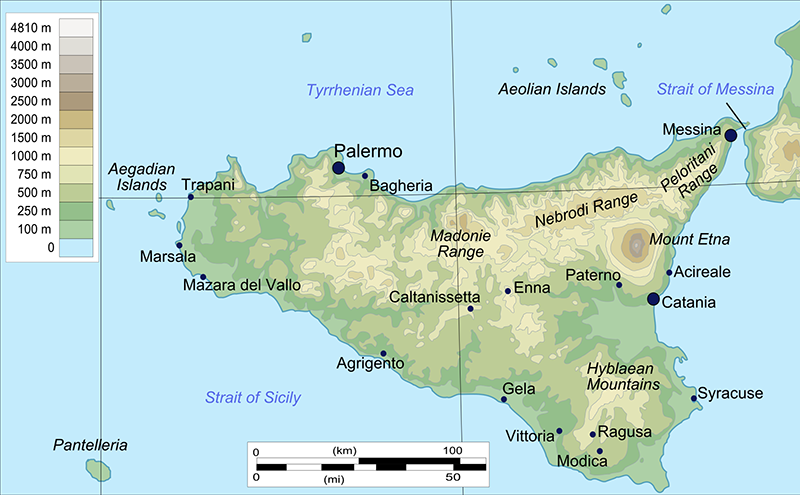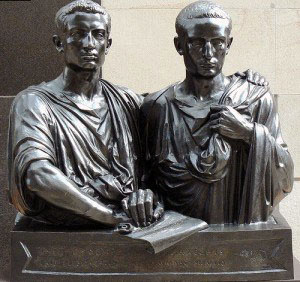The first uprisings of slaves in Roman Republic
During thirties of the II century BC aggravation of the internal situation culminated in Rome. This was manifested through uprisings of slaves and civil wars, and ultimately it lead to the collapse of the Roman Republic and the seduction of the monarchy.
The uprisings of slaves were uncommon in the earlier period of Rome, but for the first time these uprising required an army intervention of the administration. In Ostia, near Rome in 199 BC, Carthaginian hostages made a contact with the slaves, but traitors gave them away. Praetor arrested initiators and by doing that, he prevented an uprising. Soon after that, a rebellion of slaves occurred in the Praeneste (Palestrina), but it was smothered with killing of 500 slaves. Slaves are again rebelled in Etruria in 196 BC. Rebels were defeated again and the people who organized it were crucified. In the southern Italic areas and in Sicily where dominated large estates many slaves have worked there. On these estates, a situation was particularly tense. During 80’ of the II century BC, in Apulia slaves raised a rebel. Around 7.000 people were sentenced to death.
First large and particularly long-lasting uprising broke out on Sicily. Roman administration feared of Sicilian slave-owners. The administration could not do anything against slave owners, while slaves were forced to rob.



An outrage manifested in the uprising that began in 138 BC. The initiators were the slaves of the rich Damophilus. Damophilus was especially cruel slave owner. Damophilus was killed and his wife was burned alive. This was the signal for spreading of the movement. To spreading of the movement contributed the fact that most slaves were Syrian nationality. The leader was the Eunus, which had the glory of the great prophet (Syrian goddess Atargatis). Slaves proclaimed him as their king and gave him the name Antiochus.
Centre of an uprising was a city Henna (Enna). At the same time slaves in the southwest raised under the command of Cilician Cleon. He joined forces with Eunus (who become a chief executive of movement). They destroyed several Roman squads and occupied a number of important cities. Second centre of the uprising became town Tauromenium (Taormina), which uprising slaves transformed it into a fortress. Some layers of free small peasants joined them.
The Romans, had to send the consul army. In 132 BC after a long siege, Consul Rupilius managed to conquer first Tauromenium and then Henna. The rebels were defeated more by hunger than by fighting. Cleon was killed in one attack from the fortress while Eunus died in a dungeon.
Tribune of Tiberius Gracchus
The rule of nobility caused discontent among wider democratic circles. During 145 BC, people tribunes began to address to the people, and in 139 BC according to the Gabinius law (Lex Gabinia), it was introduced a secret voting by comitia. However, as the beginning of a strong democratic movement it should be considered an election for the tribune, which happened in 134 BC. The tribune was elected – Tiberius Sempronius Gracchus, an initiator and a resolute supporter of the agrarian reforms. His father was a famous military leader, diplomat and politician. Tiberius Sepronius Gracchus mother Cornelia, a daughter of Scipio the Elder, was well educated. After her husband’s death, she dedicated herself to the education of children. Gracchus family were close to the circles of Scipio Emiliano (Hellenistic philosopher). Tiberius teachers were retorician Diophanes from Mytilene and Epicurean philosopher – Blossius from Cumae.
Election of Tribune and agitation for agrarian law



In December 134 BC, Tiberius Gracchus was elected as Tribune. In 133 BC, political situation in Rome was a bit tight. Peasants started to express desire for their land. Tiberius agitated for the land reform, which aimed on restoring the free peasantry. The land reform should have raised a fighting capacity of the army and prevent uprisings of slaves, however according to Appian, Tiberius looked at this with a certain distrust.
Relying on the Law of Licinius and Sextius, Tiberius proposed to limit the scale of the occupied state land. According to the proposition of the Tiberius Law, a head of the family can have a maximum of 500 jugers, and 250 jugers for adult sons, and one family cannot have more than 1000 jugers. Every excess of land will be taken with a special fee and it will be given to the free peasants. In order to implement this Law, every year they elected a committee of three persons.
The course of reform
Tiberius’ proposal met fierce resistance by the Senate but at the same time, it had full support among the peasants. The struggle for land reform turned into a mass movement. Tiberius had to resort to obstruction, because he was forced on that by the reaction of the Senate. He closed the Temple of Saturn and he put a veto on all Senate commands.
During consideration of the legal project in Tribune commissions, a tribune Marcus Octavius (highlander) used his right to veto on the Law project. Tiberius gave an unprecedented response by asking Senate to vote on the question he had asked: “Can national Tribune be the one that will go against the interests of the people?!’’
Tiberius through his appeal placed a sovereignty of the National Assembly over constitutional traditions. His law passed and a commission of three persons was elected for distribution of land to the peasants. This commission had the highest authorities: Tiberius, Gaius – Tiberius brother and Appius Claudius Pulcher.
Tiberius soon after that included in its program a series of democratic reforms (judicial, shortening of military service…). The uncertainty of his position: re-election for national Tribune was contrary to the Roman constitution, since elections for Tribunes were held in July during field works. The main supporters of Tiberius could not attend the elections. Nevertheless, the first tribes voted for Tiberius Gracchus, but Tiberius opponents dissolve the Assembly the next day.
After that, there was an armed conflict between supporters and opponents of the brothers Gracchus. In the Senate, Tiberius Gracchus was accused that he tended to tyranny and monarchy. The group of senators insisted that Consul take decisive measures. However, Consul refused to do that and senators with great pontiff Publius Cornelius Scipio Nasica Serapio ordered the murder Tiberius and 300 of his supporters. The corpses of the killed were thrown into the river Tiber.
Assigning of the land was vitally necessary measure so it was continued also after Tiberius death. Even the most active opponents were unable to keep the implementation of the Tiberius Law. Tiberius’ death does not explain moving of his project, but it explained in a way the fact that the method itself of enforcing the law undermined the power of the Senate. This has reduced all the tradition created in the conservative aristocratic circles of Rome. Besides that, the power of the democratic movement was not sufficiently united. Gracchus support was the peasantry while urban plebs (in client relationships with nobility) did not provide sufficient support.
After Tiberius death, in Rome two main Roman political groups were formed: Optimates (aristocrats) – the best ones, and Populares (earlier plebs) – people, national.
Head of the Populares usually were someone who is nobility. In the centre of the struggle between these two parties, there were the agrarian question and the democratization of the Roman state. The work of the agrarian commission was not been suspended
Reform Gaius Sempronius Gracchus
Comparing Gracchus with his brother Tiberius, Plutarch pointed out that Gaius Gracchus was a decisive and passionate man. Both of them were widely educated and prominent speakers. After brother’s death, Gaius Gracchus was still triumvir for the allocation of land, and also quaestor in Sardinia. He was accused for causing the rebellion in Fregellae, but his actions were justified because the plebses were on his side. Gaius Sempronius Graccus was elected for tribune in 123 BC. Gaius was also elected the next year 122 BC, although he was not a candidate. Gaius turned out to be a pursuer of brother’s work and political avenger of Tiberius death. In this view merged equally personal and general political motives. The first law – calls for judicial responsibility for anyone who expels a Roman citizen without trial.
With Gaius Law Roman citizens are protected from the arbitrariness of the magistrate. Gaius Gracchus implemented military laws as well. Right after implementation of these measures, which strengthen his political position, Gracchus developed comprehensive social activity with the aim to unite all the available elements, which were hostile to the Senator class: rural and urban plebeians, as well as soldiers. He introduced obligation for the state to sell wheat to the citizens at a cheap price. The agrarian law of Tiberius was fully restored. Knights got unlimited rights for economic exploitation of the rich eastern provinces.
The establishment of colonies
Gaius Gracchus intended to establish colonies, first at the site of Capua and Tarentum. Using special Law of Tribune Rubrius (Lex Rubria) it was decided that the establishment of colonies Junonia the site of the old Carthage. Presumably, this focus was given to the creation and strengthening layer medium landowners. New colonies that were established on the sites of the old trade centres did not look at the previous military-agricultural settlements. Their establishment should have attracted the attention of traders, artisans, etc. Gaius Gracchus has enjoyed in an outstanding authority within democratic and business circles of the Roman population. In his activities, he crossed the borders that were set to the tribunes: he guided activities of agrarian commissions, foreign policy, supervised the construction of roads and foundation of colonies. The Senate accepted all his proposals. Despite the old customs, that tribune must not leave the Rome, Gaius travelled to Africa so that he can personally manage the establishment of Junonia. At the same time, opposition started to grow against him.
Crushing of Gaius Gracchus political movement and his death
Tribune Marcus Livius Drusus (elder) was harsh opponent of Gaius Gracchus. In 122 BC, Marcus Livius Drusus presented a project of a new agrarian law, which at first appeared more radical. He proposed the establishment of 12 new colonies within the borders of Italy. In these new colonies, he would move the poorest citizens and they would be free from all duties on the land. The Law obviously had a demagogic character. Livius Project was accepted and Gaius Gracchus project about the allies was rejected. Hostile agitation began to act more boldly against Gaius Gracchus and in 121 BC he was not elected as a Tribune. Consul Lucius Opimius (one of the main Gracchus opponents) convened a national Assembly in order to abolish Rubirius Law colony about Junoniji. The situation in Rome was tight. Both sides were feverishly preparing for the upcoming comitias. Gaius Gracchus and Marcus Fulvius Flaccus with their followers occupied Aventine. In the last moment, they promised freedom to slaves, but it was too late for that. Cretan mercenary archers were sent to kill Gaius Gracchus and his supporters. The conflict ended with 3.000 dead Gaius supporters. Their bodies were thrown in the river Tiber. Assets of all Gracchus supporters were confiscated. Gaius Gracchus managed to escape on the other side of the river Tiber, but in a grove of Furrina it was discovered his and his loyal slave corpses. This was a decisive confrontation with the Roman democracy where Optimates gain victory.
